Deck 16: Extraction and Other Separation Systems
Question
Question
Question
Question
Question
Question
Question
Question
Question
Question
Question
Question
Question
Question
Question
Question
Question
Question
Question
Question

Unlock Deck
Sign up to unlock the cards in this deck!
Unlock Deck
Unlock Deck
1/20
Play
Full screen (f)
Deck 16: Extraction and Other Separation Systems
1
The Absorption Column in absorption and stripping does all the following except: (Select all that apply)
A) The liquid phase removes lighter components from the vapor phase.
B) One direction component removal.
C) Reverses absorption process.
D) Strips out hydrocarbons from absorption oil.
E) A & B
F) C & D
A) The liquid phase removes lighter components from the vapor phase.
B) One direction component removal.
C) Reverses absorption process.
D) Strips out hydrocarbons from absorption oil.
E) A & B
F) C & D
C & D
2
Adsorption is best described as:
A) To remove liquid hydrocarbons from the absorption oil.
B) Beadlike particles that contain charged ions on solid surfaces.
C) Removing the moisture content to .5%.
D) The process in which an impurity is removed from a process stream by making it adhere to the surfaces of a solid.
A) To remove liquid hydrocarbons from the absorption oil.
B) Beadlike particles that contain charged ions on solid surfaces.
C) Removing the moisture content to .5%.
D) The process in which an impurity is removed from a process stream by making it adhere to the surfaces of a solid.
The process in which an impurity is removed from a process stream by making it adhere to the surfaces of a solid.
3
A scrubber is best described as:
A) A device used to remove chemicals and solids fro process gases.
B) A device filled with a porous solid to remove gases and liquids from a mixture.
C) A device used to remove selected components from a gas stream by contacting it with a gas or liquid.
D) The second solution that forms a solvent to dissolve a solute.
A) A device used to remove chemicals and solids fro process gases.
B) A device filled with a porous solid to remove gases and liquids from a mixture.
C) A device used to remove selected components from a gas stream by contacting it with a gas or liquid.
D) The second solution that forms a solvent to dissolve a solute.
A device used to remove chemicals and solids fro process gases.
4
Regeneration and drying is best defined as all of the following except:
A) In drying the removal of relatively small amounts of water or other liquids from solids or gases.
B) Drying Is typically the final step in a series of operations.
C) Regeneration usually consists of two vessels (beds) containing a granular solid.
D) In regeneration the solid is specifically chosen for its high adsorbency of the target vapor and ease of regeneration.
E) In drying and regeneration dirty gases are absorbed into the liquid medium.
A) In drying the removal of relatively small amounts of water or other liquids from solids or gases.
B) Drying Is typically the final step in a series of operations.
C) Regeneration usually consists of two vessels (beds) containing a granular solid.
D) In regeneration the solid is specifically chosen for its high adsorbency of the target vapor and ease of regeneration.
E) In drying and regeneration dirty gases are absorbed into the liquid medium.

Unlock Deck
Unlock for access to all 20 flashcards in this deck.
Unlock Deck
k this deck
5
Extraction is defined as a process for separating two materials by:
A) contacting them with a third material
B) boiling point
C) forming a reaction
D) generating crystals
A) contacting them with a third material
B) boiling point
C) forming a reaction
D) generating crystals

Unlock Deck
Unlock for access to all 20 flashcards in this deck.
Unlock Deck
k this deck
6
In extraction a solvent is a chemical that will:
A) initiate a reaction
B) boil the mixture
C) combine crystals
D) dissolve another chemical.
A) initiate a reaction
B) boil the mixture
C) combine crystals
D) dissolve another chemical.

Unlock Deck
Unlock for access to all 20 flashcards in this deck.
Unlock Deck
k this deck
7
The ________ is the material that is dissolved in the extraction process.
A) solvent
B) solute
C) extract
D) raffinate
A) solvent
B) solute
C) extract
D) raffinate

Unlock Deck
Unlock for access to all 20 flashcards in this deck.
Unlock Deck
k this deck
8
Identify the following components.
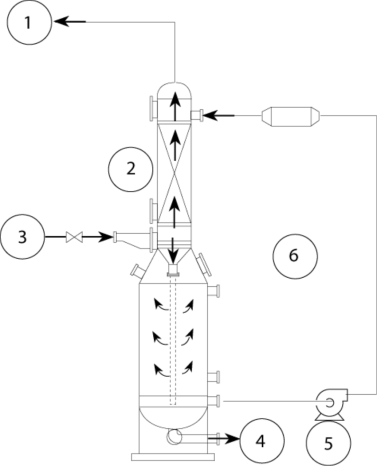


Unlock Deck
Unlock for access to all 20 flashcards in this deck.
Unlock Deck
k this deck
9
An absorber column is a device used to remove selected components from a gas stream by:
A) contacting it with a gas or liquid
B) distilling it
C) reaction
D) steam stripping
A) contacting it with a gas or liquid
B) distilling it
C) reaction
D) steam stripping

Unlock Deck
Unlock for access to all 20 flashcards in this deck.
Unlock Deck
k this deck
10
Crystallization is often referred to as the opposite of what other common process?
A) distillation
B) dissolving
C) reaction
D) extraction
A) distillation
B) dissolving
C) reaction
D) extraction

Unlock Deck
Unlock for access to all 20 flashcards in this deck.
Unlock Deck
k this deck
11
List the following components.
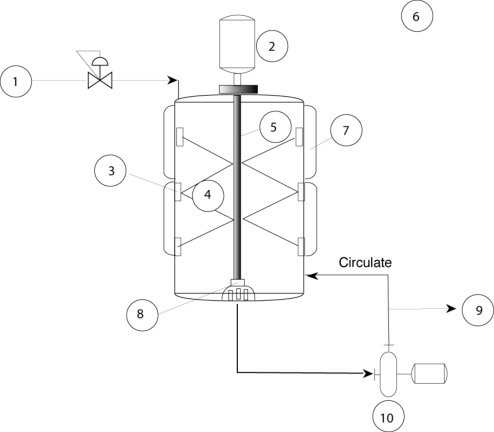


Unlock Deck
Unlock for access to all 20 flashcards in this deck.
Unlock Deck
k this deck
12
What does the term layer out mean?
A) reaction is complete
B) solids float to top
C) components in the mixture separate into distinct layers.
D) solids drop out
A) reaction is complete
B) solids float to top
C) components in the mixture separate into distinct layers.
D) solids drop out

Unlock Deck
Unlock for access to all 20 flashcards in this deck.
Unlock Deck
k this deck
13
List the following components.
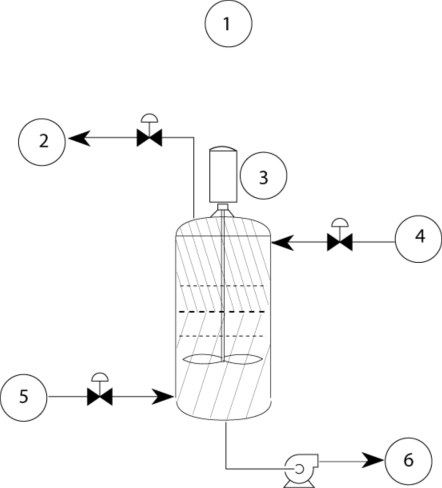


Unlock Deck
Unlock for access to all 20 flashcards in this deck.
Unlock Deck
k this deck
14
Label the following components.
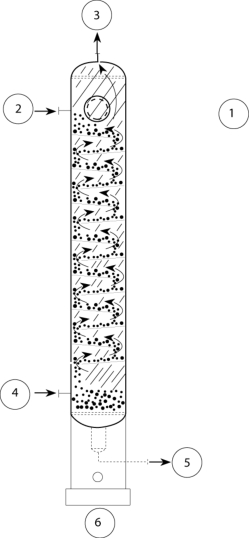


Unlock Deck
Unlock for access to all 20 flashcards in this deck.
Unlock Deck
k this deck
15
Solvent dewaxing is defined as:
A) the removal of wax from lubricating oils.
B) The removal of solvent from lubricating oils.
C) The removal of water from hydrocarbons.
D) The blending of wax, solvent and light oils.
A) the removal of wax from lubricating oils.
B) The removal of solvent from lubricating oils.
C) The removal of water from hydrocarbons.
D) The blending of wax, solvent and light oils.

Unlock Deck
Unlock for access to all 20 flashcards in this deck.
Unlock Deck
k this deck
16
Label the following components.
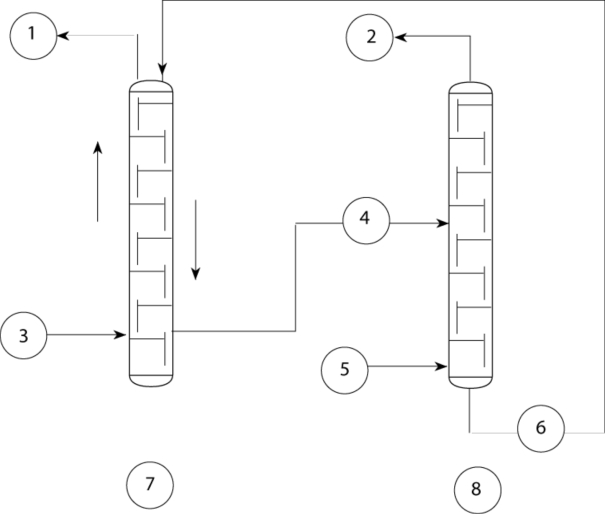


Unlock Deck
Unlock for access to all 20 flashcards in this deck.
Unlock Deck
k this deck
17
There are three basic types of extraction:
A) liquid-solid, liquid-liquid, solvent
B) leeching, liquid-liquid, washing
C) liquid-liquid, distillation, reaction
D) centrifuge, organic, inorganic
A) liquid-solid, liquid-liquid, solvent
B) leeching, liquid-liquid, washing
C) liquid-liquid, distillation, reaction
D) centrifuge, organic, inorganic

Unlock Deck
Unlock for access to all 20 flashcards in this deck.
Unlock Deck
k this deck
18
In liquid-liquid extraction the ____ is the name given to the original solution.
A) feed
B) extract
C) raffinate
D) solvent
A) feed
B) extract
C) raffinate
D) solvent

Unlock Deck
Unlock for access to all 20 flashcards in this deck.
Unlock Deck
k this deck
19
The ________ is the name given to the second solution that is formed when the _________ dissolves the solute.
A) extract, solvent
B) raffinate, solvent
C) solvent, extract
D) raffinate, extract
A) extract, solvent
B) raffinate, solvent
C) solvent, extract
D) raffinate, extract

Unlock Deck
Unlock for access to all 20 flashcards in this deck.
Unlock Deck
k this deck
20
What are the three main classifications of extraction columns?
A) packed, tray, mechanical
B) hyperbolic, atmospheric, packed
C) forced, induced, natural
D) reaction, mixing, mechanical
A) packed, tray, mechanical
B) hyperbolic, atmospheric, packed
C) forced, induced, natural
D) reaction, mixing, mechanical

Unlock Deck
Unlock for access to all 20 flashcards in this deck.
Unlock Deck
k this deck



